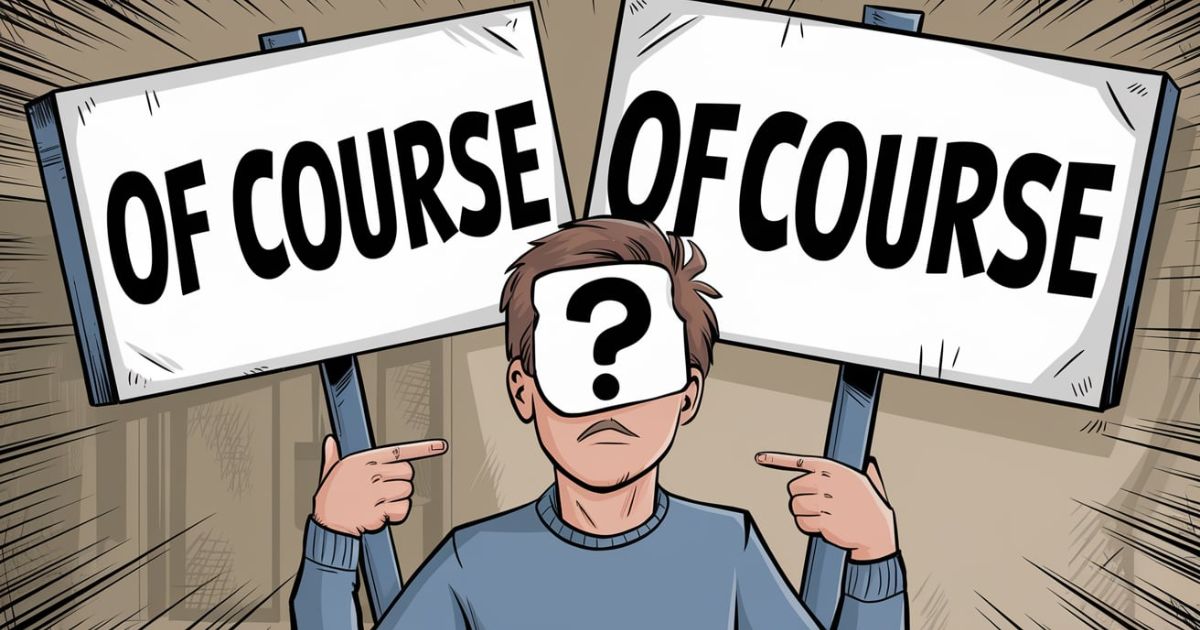Choosing the right phrase when writing can be tricky. One common confusion arises between “of course” and “ofcourse.” These two phrases may look similar, but only one is correct in English. In this article, we’ll explore the correct usage of “of course” and explain why “ofcourse” is a mistake.
You’ll learn how to use the phrase properly in different situations and feel confident when using it in your writing. Whether you’re writing an essay, an email, or a text message, knowing the difference between Of Course or Ofcourse is essential. Let’s dive into it!
Why is There Confusion?
There are many reasons why people confuse “of course” with “ofcourse.” One reason is how fast we speak. In conversation, words can sound like they run together. For example, when you say “of course” quickly, it might sound like one word. But, no matter how it sounds, it should always be written as two words: “of course”.
Another reason is that English has many compound words, like “notebook” or “classroom.” These words are made up of two smaller words put together. People might think “ofcourse” is one of those, but it isn’t. It’s a mistake and not a real word in English.
READ MORE: Pre vs Post: Which Prefix to Use?
What Do “Of Course” and “Ofcourse” Mean?
“Of Course”
“Of course” is a common phrase in English. It means something is obvious, expected, or understood. You use it to agree with someone or to show certainty. For example, you might say, “Of course I will help you with your homework,” meaning it is clear or certain that you will help.
Of Course Meaning
The meaning of “of course” is simple. It is used to show that something is already known or expected. It can also mean “definitely” or “certainly.” If someone asks, “Are you coming to the party?” and you say, “Of course, I am!” it means you are definitely coming.
“Ofcourse”
“Ofcourse” misspelling often happens when people try to combine “of” and “course” into one word. However, “ofcourse” is not correct in any form of English. It’s just a misspelling of the correct phrase. No matter what, always write “of course” as two words.
Synonyms and Similar Terms to “Of Course”
Sometimes you might want to use a different phrase but mean the same thing as “of course.” Here are some synonyms for “of course” that you can use in both formal and informal situations:
- Certainly: You can use this in formal writing or polite speech. For example, “Certainly, I’ll help you.”
- Absolutely: This shows strong agreement. For example, “Absolutely, I’m happy to assist.”
- Naturally: You use this when something is expected or obvious. For example, “Naturally, she finished first.”
- Sure: This is a more casual way to agree. For example, “Sure, I’ll come with you.”
- Without a doubt: This phrase emphasizes certainty. For example, “Without a doubt, he’s the best player.”
These phrases work well when you want to agree politely or confirm something.
When and How to Use “Of Course”
Now that you know what “of course” means, let’s look at how and when to use it. How to use “of course” depends on the situation.
To Show Agreement or Acceptance
You often use “of course” to agree with someone or to say yes politely. Here’s an example:
Example:
Person A: “Can you help me with my homework?”
Person B: “Of course! I’ll help you right now.”
In this case, “of course” shows that Person B is happy to agree and help.
To Indicate Something is Obvious or Expected
You can also use “of course” when something is already known or expected.
Example:
Person A: “Do you know how to cook pasta?”
Person B: “Of course! I’ve cooked it many times before.”
Here, Person B is saying that it is obvious they know how to cook pasta.
To Add Emphasis
Sometimes, you want to add a little extra emphasis to your statement. “Of course” can help with that.
Example:
Person A: “Should we finish this project on time?”
Person B: “Of course! It’s very important.”
In this example, using “of course” emphasizes how important it is to finish the project.
In Polite Responses
Finally, “of course” is often used in polite replies. It can make your answer sound more friendly and kind.
Example:
Person A: “Thank you for your help.”
Person B: “Of course! Anytime.”
This is a polite and friendly way to respond when someone thanks you.
Examples of “Of Course” in Sentences
To help you understand better, here are some more “of course examples” used in sentences:
- Of course, I’ll join you for dinner tonight.
- You should, of course, study for your exams.
- Of course, she finished the race first.
- Of course, it’s important to drink water every day.
- He was, of course, the best player on the team.
These examples show how flexible and useful “of course” can be in your everyday conversations and writing.
Origins of “Of Course”
The phrase “of course” has been around for a long time. It comes from the idea of something following a natural or expected path, like the course of a river or road. The word “course” comes from the Latin word “cursus,” which means “a running.” This is why “of course” means that something is natural or expected. The phrase became more common in the 16th century and has been widely used ever since.
Off Course vs Of Course
There is another phrase that sounds very similar to “of course” but means something completely different. This is “off course.” The phrase “off course” means that something has gone off its planned path. For example, if a plane flies in the wrong direction, we say it is “off course.” Here’s how to tell the difference:
- Of course: Used to express agreement, certainty, or something obvious.
- Off course: Used to say something has gone in the wrong direction.
Example:
“The ship went off course because of the storm,” meaning the ship did not stay on the correct path.
Don’t confuse “off course” with “of course.” They sound similar, but they mean very different things!
ALSO READ: What is the Past Tense of Swing? Is it Swing, Swang, or Swung?
Conclusion
It’s important to know the correct phrase for agreement, and “of course” is the right choice. The correct usage of “of course” can help make your writing clearer and more professional. Remember, “ofcourse” is a misspelling and should be avoided. By using “of course” properly, you can express certainty, agreement, or something obvious in a polite and effective way.
Sources
The article on the correct usage of “of course” versus “ofcourse” was primarily based on general knowledge of English language rules and common usage. Here are some references that inform the content covered in the article:
Sources
- Grammar and Usage Resources: Websites like Grammarly, Purdue OWL, and Merriam-Webster offer comprehensive guidelines on grammar, including the proper use of phrases like “of course.”
- Grammarly Blog
- Purdue OWL
- Merriam-Webster Dictionary
- Educational Textbooks: Many English grammar textbooks provide insights into common phrases and their meanings, as well as the importance of correct spelling and grammar usage.
- Writing Style Guides: Style guides like The Chicago Manual of Style and The Elements of Style by Strunk and White cover proper usage of phrases and help writers avoid common mistakes.

Osbert is a skilled linguist and educator specializing in English grammar and vocabulary. With years of experience, he has dedicated his career to helping learners enhance their language skills. Osbert is passionate about simplifying complex grammar concepts and is the founder of EnglishInfoz.com, a platform focused on English language education.
